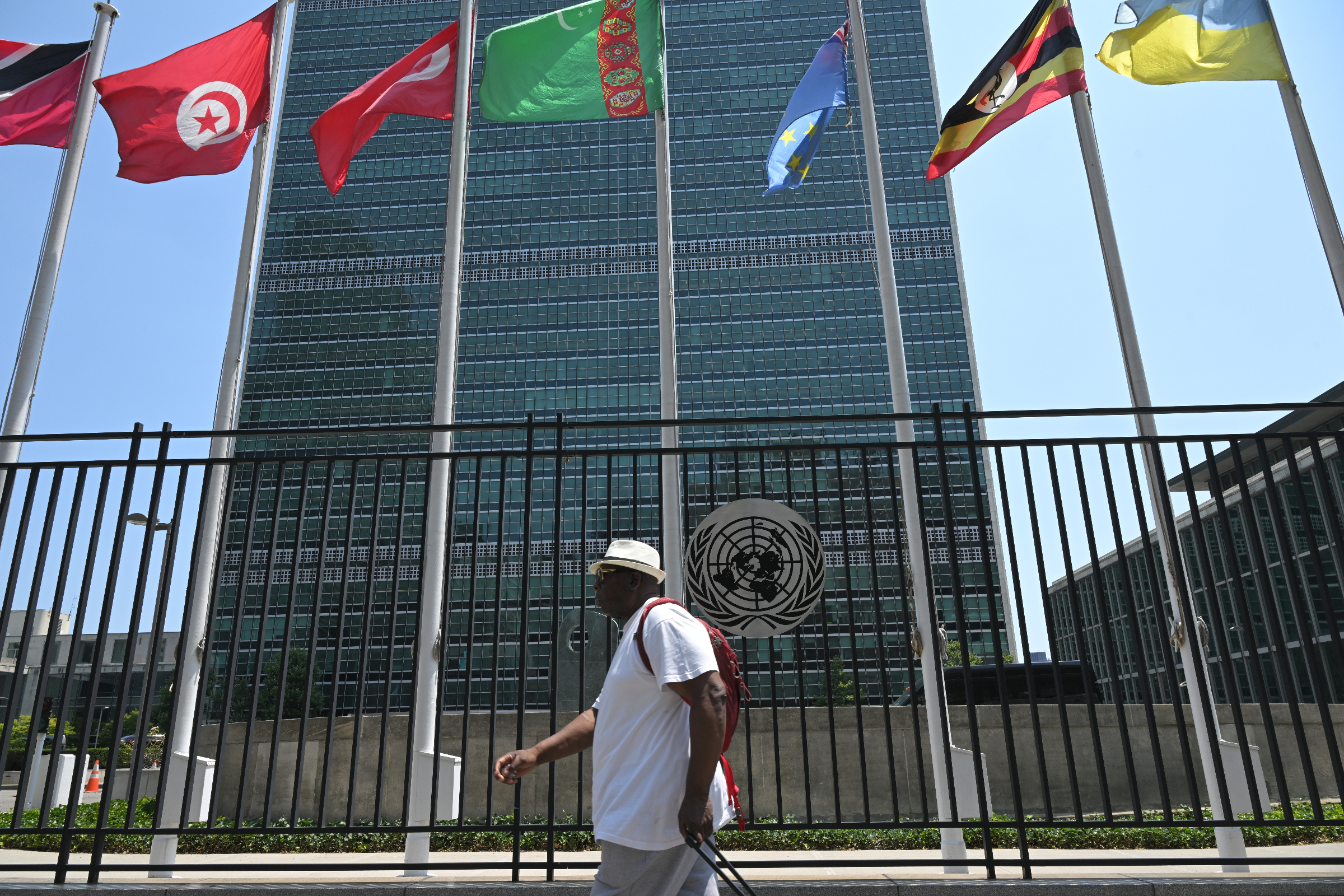Share post now
UN tax convention
Temperatures also rising on the tax policy front in New York
26.07.2024, Finance and tax policy
Next week ushers in another round of negotiations on a Framework Tax Convention at the UN headquarters in New York. Recently, the Swiss Cantons of Basel City and Zug, noted for their low corporate tax rates, again provided new material illustrating why this is an absolute necessity.

Until mid-August, countries from the Global South in particular will be campaigning in New York for a strong UN tax convention - this is likely to make Switzerland and other profiteers of the current tax system sweat. © KEYSTONE / SPUTNIK / Sergey Guneev
Over the next three weeks, the Ad Hoc Committee to Draft Terms of Reference for a United Nations Framework Convention on International Tax Cooperation will be determining the policy scope of the new Framework Convention and also its decision-making procedure. What sounds extremely technical is of great political significance in that, by mid-August, negotiators must determine how much power the Organization for Economic Cooperation and Development (OECD) will hand over to the UN, having dominated the multilateral agenda in international tax policy matters since the 1970s. Should the UN take over the reins in global tax policy in the future, the countries of the North – which continue to dominate economic policy despite the rise of China – would be relinquishing some of their supremacy in this key aspect of tax policy. As might be expected, there is great resistance to a robust UN tax convention from the EU, the USA and the erstwhile beneficiaries of the OECD-led international tax system, i.e., low corporate tax jurisdictions and major financial centres. Both business models benefit from the fact that, despite all the OECD reforms of the past 10 years, corporate profits and assets can still be taxed where rates are lowest or not be taxed at all.
The South in a key position
Negotiating multilateral tax questions in the UN instead of the OECD will alter the majority structure, placing the countries of the South in a key position. The Draft Terms of Reference (ToR) recently released by the Bureau of the Ad Hoc Committee reflects this. The text directly links the tax convention with the funding of the UN Sustainable Development Goals (SDGs), and states the Convention’s aim, among other things, to "Establish an inclusive, fair, transparent, efficient, equitable, and effective international tax system for sustainable development". This aim is to be achieved in the following areas through the corresponding undertakings by signatory countries:
- The fair allocation of taxing rights vis-a-vis multinational enterprises,
- the effective taxation of high-net worth individuals,
- ensuring that tax measures contribute to addressing environmental challenges,
- effective transparency and information sharing for tax purposes,
- the effective prevention and resolution of tax disputes.
Should all these elements be included in the final version of the ToR, all major contemporary problems of international tax policy could in future be addressed in the UN framework: profit-shifting by multinational enterprises to low-tax jurisdictions; high-net worth individuals, who use cunning constructs to evade tax authorities in the global offshore system; the fact that today, taxes are not nearly being sufficiently harnessed as a tool for economic management in the climate policy framework; the lack of transparency in global asset management, and the absence of a level playing field between countries of domicile of multinational enterprises, those that are their markets, and those where their production takes place, when it comes to settling disputes over questions of who may tax which profits of these enterprises, and where. The strong opposition from the Global North is therefore no surprise, even though it is rarely ever made truly explicit.
Unconstructive Switzerland
Switzerland's position on the Draft Terms of Reference is symptomatic of this negotiating tactic adopted by the rich countries, which opt for subterfuge rather than explicitly laying out and defending their own interests. Like most OECD and EU countries, Switzerland favours decision-making by consensus, as the only way to implement, in practice, the multilateral reforms to the international tax system taken up in the Convention. At the same time, Switzerland wishes – again in line with the OECD majority and the EU – to negotiate in the UN framework only topics that have not yet been addressed in the OECD. This excludes corporate taxation, tax transparency, better taxation of high net worth individuals, and new dispute settlement mechanisms. In this connection, Switzerland speaks of a duplication of multinational forums.
However, the ongoing worldwide implementation of the OECD minimum tax clearly shows that talk of "duplication" can only come from a privileged Northern perspective. For the Global South, the minimum tax yields practically nothing, and it will benefit the very same low-tax jurisdictions that have exploited the shortcomings of the corporate taxation system in place hitherto, in order to tax profits amongst themselves while the underlying wealth creation itself takes place elsewhere. Only those who are thriving under the OECD system can regard a new intergovernmental forum at the United Nations as "duplication", in other words, as basically superfluous.
Pondering blockchain instead of sustainable development
This undoubtedly applies to Switzerland. The Swiss Cantons of Basel City and Zug are good examples. While it is Roche, Novartis and company that ensure the generation of eye-watering levels of profit tax revenue and massive budget surpluses (+434 million in 2023) in Basel, it is mainly the commodity traders that play this role in Zug (460 million). A disproportionately large profit tax base is generated in both cantons, considering that the branches domiciled there actually create wealth mainly abroad (production of medicaments and also much of Research & Development do not take place in Basel, while Zug has no copper mines or oilfields). Both expect more revenues to flow into the cantonal coffers with the introduction of the OECD minimum tax. But even at this stage, both cantonal governments no longer seem to know what to do with all that money. They are both planning to use new subsidy instruments to return the additional tax revenues to the very companies that have to pay the minimum tax. In Basel, this is being presented, among other things, as promoting equality (the canton is planning, for example, to partially fund parental leave for employees of highly profitable corporations). Zug has evinced a sudden onset of social policy progressiveness. In the next two years, the canton is expected to assume all hospital costs incurred by its residents. It will also provide support in childcare, free access to top-class medical care – both being crucial components of sustainable development. Workers in the pharmaceutical factories of South Asia or the mines of Africa operated by corporations domiciled in Basel and Zug can only dream of these two things. Yet, no-one in the governments of the two luxury cantons has thought of investing the surplus tax revenue in sustainable development in the Global South. Instead, the Canton of Zug (still striving for Crypto Valley status) prefers to buy an entire university institute for blockchain research in neighbouring Lucerne.
No trace of any worldwide duplication of Zug's prosperity. Instead, the OECD regime obviously obeys the principle whereby, "to him that hath, more shall be given". This alone is reason enough to strive for a fair global tax system under the UN umbrella. It is a given that this will not please Swiss officialdom, so long as it fails to fundamentally overhaul its own business model.
For further information and an overview of the tax negotiations within the UN, read also the Briefing Paper (in German), written by the Global Policy Forum and the Netzwerk Steuergerechtigkeit (Tax Justice Network), among others.
